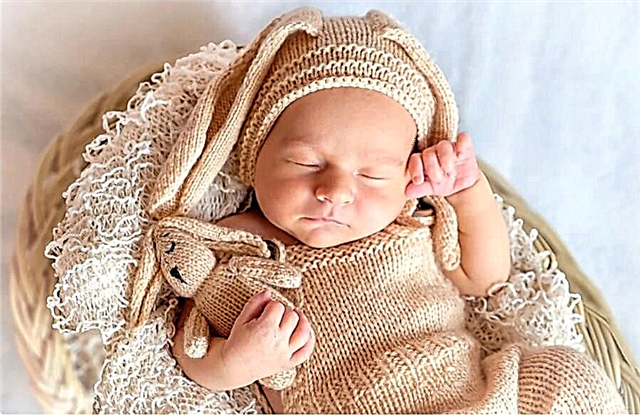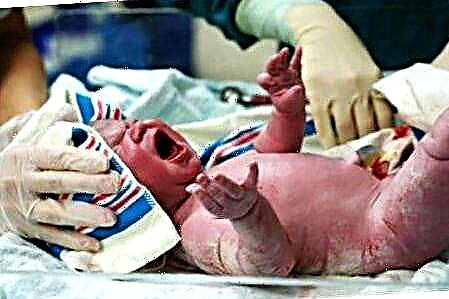In newborns, all systems are imperfect, this is predetermined by nature. Mom, however, gets stressed when the baby sweats a lot during sleep. Some associate this phenomenon with illness and try to identify it. Therefore, it is worth talking about the causes of sweating so that you know when to sound the alarm.

The baby is sweating heavily
Features of thermoregulation of babies
Nature designed it so that a person would feel comfortable in any season: he would not overcool and not overheat. A physicochemical process called thermoregulation maintains body temperature stability. It, in turn, is based on 2 components:
- Heat products. In adults and children over a year old, muscle movements and fiber contractions contribute to the formation of heat. Newborns of the first months of life are limited in such actions. But nature took care of their thermal genesis, laying layers of brown fat under the skin (even in prenatal development). The splitting of this "strategic reserve" is accompanied by the release of heat. The more the baby is immobile, the more active fat is oxidized. Therefore, sweating is observed more often during sleep, and not during wakefulness.
- Heat transfer. It is necessary to avoid overheating of the body. The nervous system is sensitive to ambient temperature. In extreme heat, skin vessels dilate, blood rushes to the surface, and excess heat leaves the body through the pores. If a person freezes, the opposite process takes place, allowing you to keep warm inside. In an infant, due to the absence of a subcutaneous thermoregulatory layer, even with vasospasm, increased sweating is observed.
The formation of heat and its return is directed by the hypothalamus. Despite the fact that the center of thermoregulation is located in the depths of the brain, the process occurs autonomously.
Other organs are also involved in the regulation: the thyroid gland, the adrenal glands, which are responsible for the breakdown of subcutaneous fat. Therefore, in addition to the impulses sent by the nervous system to the brain, the hypothalamus also reacts to hormones, mediators and pyrogens.
While the little one is awake and performs some movements (waving arms, legs, eating or crying), the mechanism for generating heat is activated. As soon as the baby falls asleep, the thermoregulation switches to the “autopilot” mode, focusing more on heat transfer control.
Why does the child sweat a lot when he sleeps
Sweating is normal, if there are no accompanying symptoms, then, according to Dr. Komarovsky, there is no reason to worry. One child sweats profusely during sleep, the other does not. The process of thermoregulation is influenced by many factors, some of which are quite harmless.
Physiological causes
The rate of heat exchange is influenced by both the external environment and a number of processes occurring in the body:
- One of the reasons mentioned above is the air temperature. During sleep, the baby sweats not only because it is too hot in the room, the imperfection of the heat transfer of the small organism makes the baby sweat from the cold;

Baby wrapped up
- If the baby was overly active before going to bed, his body temperature increased. It takes at least 2 hours for the indicator to return to normal, therefore, while falling asleep, the baby continues to sweat;
- Such elementary things as pajamas and bedding can also enhance the process of thermoregulation. If synthetics are present in them, it does not allow the body to “breathe” fully, provoking cooling. As a result, the internal "heating system" is activated.
Note. Feeding is the same job, the harder the baby sucks at the breast, the more the child's body produces heat, forcing the little one to sweat.
Not only nighttime sleep, but also daytime sleep, is accompanied by heavy sweating if the child receiving the subsidy ate just before falling asleep. The process of digesting food takes time and is accompanied by the release of heat.
Psychological factors
Since the nervous system is involved in the regulation of heat exchange processes, any emotional outburst will cause sweating. It doesn't matter if the emotional experiences were negative or positive. Infant can become overexcited from pain, hunger, stress from parting with mom or weaning.

The little one is overexcited
Psychological factors can also include meeting other children, contact with an animal, or the joy of having a new toy. Excitation of the nervous system makes the dream restless and makes the little one sweat profusely.
Pathological
Genetics is another cause of excessive sweating. At the same time, the problem is not caused by the fluid itself, leaving through the pores, but by pathological diseases that affect thermoregulation. It is not difficult to determine this factor - according to the special characteristics of sweat.
Cystic fibrosis is accompanied by increased levels of chlorine and sodium, which give the sweat a salty taste. If the metabolism of amino acids is disturbed, the liquid released through the pores has a mouse smell.
Acquired diseases
Some mothers believe that if a child sweats in a dream, then he is sick. Indeed, with colds, inflammatory processes, the body temperature rises so that toxins come out of the body with abundant sweat.
The symptoms of such diseases are easily recognized, which makes it possible to promptly eliminate the arising factor. There is one disease that does not appear immediately. Heavy sweating is a dangerous sign of rickets, the rudiments of which can arise in 1-2 months.

Suspicion of rickets
To avoid the serious consequences of pathology, the mother should know how and when exactly the infant sweats:
- skin pores are moistened not only when the baby is asleep, but also from any stress (while eating, when trying, crying);
- the head sweats most of all (its scalp and face);
- sweat irritates the skin, which is why the baby actively rubs his head against the pillow (as evidenced by the characteristic bald patches on the back of the head);
- no matter how often the little one is bathed, his body still exudes a specific sour smell.
On a note. A kid with rickets is too excitable, flinches from bright light and sounds (even quiet ones). The child's sleep is restless and disturbing.
When increased sweating is normal
The higher the body temperature, the more the baby will sweat. Since babies have imperfect thermoregulation, more heat is generated in their bodies than in adults. Therefore, slightly different temperature parameters are taken as the norm.
In newborns, the indicator can stay within 37.5 ° in a calm state and rise to 38 ° from crying or overexcitement.
If there are no other symptoms that cause anxiety, then you should not worry about excessive sweating. As soon as the baby calms down, the temperature will stabilize.
How to help a child
Having decided on the reasons why the child sweats at night, the parents (if possible) eliminate the negative factors.
Optimal climate
One of the elements of caring for an infant is maintaining the correct humidity and temperature in the nursery. The first parameter should always be within 60%. As for the second indicator, it should be adjusted according to the age of the toddler:
- the first weeks after arrival from the hospital keep warm within 25 °;
- by the 2nd month, gradually reduce to 23 °;
- from six months, the optimal indicator is 18-20 °.
By keeping the temperature within the specified range, overheating of the baby can be avoided. The toddler will not be and it will be cold even in light undershirts (after all, the internal thermoregulation system will take care of it).
How comfortable a child is in the room can be judged by the condition of the skin on the neck. If it's cool and dry, the baby is cold. Overheating is indicated by a hot, moist dermis.
Council. One way to maintain optimal humidity is to ventilate the room before bed. A hygrometer installed in the bedroom will help to monitor the indicators.
Bathing
To prevent the baby from freezing during the hygienic procedure, the water in the pelvis should be equal to body temperature (37 °). The air parameters are maintained within the range of 25-27 °. This is due to the fact that heat exchange increases upon contact with water. When the indicators are lower, the baby will freeze and get sick.

Water temperature control
Herbal baths
If a child sweats a lot when sleeping, it is recommended to bathe him in herbal infusions. Collecting string and chamomile (in equal quantities) will help to cope with the problem. Take 6 tbsp. mixture, pour 1 liter of boiling water and leave for 30-40 minutes. Such baths allow you to regulate perspiration and have a beneficial effect on the baby's sleep.
Nutrition
In a breastfed baby, the thermoregulatory system works well if the mother follows the correct diet. Spicy, spicy, fried, fatty foods absorbed by a woman stimulate the child's nervous system.
As soon as the mother has to drink coffee, take alcohol, take a drag on a cigarette before feeding, the baby's body will be filled with toxins that have got there with breast milk.
Therefore, if a child begins to sweat excessively in a dream for no apparent reason, nursing needs to adjust its diet, excluding harmful products and those that provoke allergic reactions.
Bed
Perhaps the baby is uncomfortable sleeping in the crib, and from the discomfort (cool synthetic sheet, prickly or hot bedspread), he begins to sweat. Sometimes it is enough to change bed linen, pajamas or a blanket, like a dream, and with it the heat transfer is normalized.
Emotional overload
Kids are quickly excited, psychological stress goes down slowly. Therefore, the 2 hours preceding sleep should be emotionally calm:
- All games, gymnastics are left for daytime.
- Feeding, after which the little one goes to bed, is best done not while watching TV.
- Adults should not sort things out in the presence of a baby (especially in a raised tone).

Calming the little one
If the crumbs have an emotionally overloaded day, by the evening the mother leaves all extraneous matters and takes care of the child. Lullaby, quiet reading of nursery rhymes, motion sickness to a smoothly flowing melody will calm the baby, providing a healthy sleep, during which the baby will not sweat excessively.
When to contact a specialist
If the organization of the child's sleep, the creation of comfortable living conditions do not work, and the little one continues to sweat a lot, a doctor's consultation is necessary. In cases where the violation of thermoregulation is accompanied by other negative signs (unpleasant odor, taste of sweat, high temperature that does not subside for a long time, etc.), do not hesitate to visit a specialist.
In addition to inflammation, disorders of the nervous system, rickets, the crumbs may have genetic pathologies that parents do not even know about.



